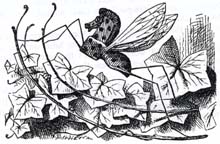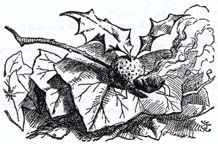When Lewis Carroll dreamed up the world of Alice in Wonderland, he gave readers one of the most familiar works inviting Victorian society to escape from its troubles. Yet in contrast to his use of the story as a diversion from these problems, Carroll also created Alice and her imagined world as a chance to comment and reflect upon them. In Alice and Through the Looking Glass, he mixed great wit and appropriate gravity to explore starvation and malnutrition, paralleling his own society's effort to survive. For example, Alice continuously looked towards eating to alter her size in this fantasy world. Carroll demonstrated an understandable preoccupation with food in Wonderland as a way of sharing his thoughts on hunger in Victorian society.
Alice expressed her wish to be larger to ensure her own safety in playing with a dog she encountered:
"I'd nearly forgotten that I've got to grow up again! Let me see — how is it to be managed? I suppose I ought to eat or drink something or other; but the great question is 'What?'" The great question certainly was "What?" Alice looked all round her at the flowers and the blades of grass, but she could not see anything that looked like the right thing to eat or drink under the circumstances (Norton Critical Edition 33).
This passage suggests Victorian society's preoccupation with food and drink. Many articles in the Victorian Web discuss this subject as the social and political contexts of the work. Under the heading of malnutrition, the discussion narrows and can be studied in more detail. During the 1830s and 1840s, there was an enormous shortage of food, driving the prices much higher than many could afford. Many found themselves scrounging for food, as Alice did, or even going hungry. But in Carroll's fantasy world, Alice found something to eat in the form of a gigantic mushroom. Nature, and its ability to provide food, sheds some light on the author's search for possible ways of saving his starving society. But in Carroll's reality, even nature could not save many from their intense and dire hunger. He escaped from the starving Victorian world into the imaginative and childlike world of Alice, but the reader can still see the strong traces of the food shortage in his work.
The scant supply of food dealt a devastating blow to the health of many people of Carroll's time. Among the lower classes, women often grew to a much lower height and weight, leading to many problems in childbirth. Contamination levels rose in both the food market and in the water supply. The poorer classes became even more susceptible to disease and malnutrition.


[Click on thuumbnails for larger images and more information.]
The plentiful supply of food in Wonderland blatantly contrasts the true situation in the Victorian world at the time. Despite the vast quantity of sustenance in Wonderland, many of the foods that satisfied Alice were unhealthy, such as cake — rarely thought of as an important part of one's diet. Furthermore, many of the sources of food in Wonderland are entirely imagined and could never prove as valuable rations for Victorian society. A giant gnat showed Alice some of the insects of the Looking Glass world, including the Snap-dragon-fly and the Bread-and-Butterfly. In Alice's world, one of the least appetizing things found in nature represented food, possibly implying that Victorian society was so threatened by the food shortage that many would be forced to sink to unthinkable depths, such as consuming insects for sustenance. However, as Carroll developed this idea, he showed a more philosophical and removed perspective of his society. When Alice sees the Bread-and-Butterfly, the following dialogue ensues with the Gnat, beginning with Alice's question:
And what does it live on?"
"Weak tea with cream in it."
A new difficulty came into Alice's head. "Supposing it couldn't find any?" she suggested.
"Then it would die, of course."
"But that must happen very often," Alice remarked thoughtfully.
"It always happens." (134)
Alice's assumption that starvation must happen often and the Gnat's reassurance that it was an ordinary occurrence add to the social context of the writing in a humorous light. But once again, Carroll's words in this fantasy land echo the historical articles which describe the malnutrition and starvation in the Victorian world that was his reality. This social context had clear and evident effects on Carroll's writing. He also seemed to bring a more encompassing picture to his society through his fantasy writing, rather than simply recording the existence of starvation and malnutrition in the Victorian world. That is, Alice's fantasy claim that insects must always die from hunger, and the Gnat's confirmation in response, was the author's assertion that hunger is universal in the world and inevitable.
Last modified December 1995